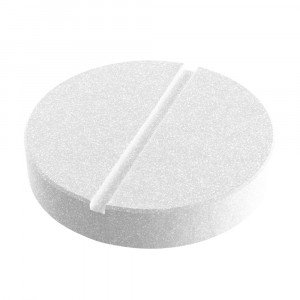 Welcome
Welcome
“May all be happy, may all be healed, may all be at peace and may no one ever suffer."
Al-Madina Pharmaceuticals Ltd.
Claviator-CV 500mg + 125mg

Generic for Diseases
- Acute bacterial sinusitis
- Bronchitis
Cefuroxime is a bactericidal second generation cephalosporin antibiotic which is active against a wide range of Gram-positive and Gram-negative susceptible organisms including many beta-lactamase producing strains. Cefuroxime inhibits bacterial cell wall synthesis by interfering with the transpeptidation process.
Clavulanic acid is a naturally derived beta lactamase inhibitor produced by Streptomyces clavuligerus. It has similar structure to beta lactam antibiotics which binds irreversibly to beta-lactamase enzymes and inactivates them. Clavulanic acid gives protection of Cefuroxime from degradation by beta lactamase enzymes and provides a solution for the treatment of bacterial infections caused by beta lactam resistant bacteria.
It is indicated for the treatment of infections caused by sensitive bacteria.
- Pharyngitis/Tonsillitis caused by Streptococcus pyogenes.
- Acute Bacterial Otitis Media caused by Streptococcus pneumoniae, Haemophilus influenzae, Moraxella catarrhalis (beta-lactamase producing strains) or Streptococcus pyogenes.
- Acute bacterial maxillary sinusitis caused by Streptococcus pneumoniae or Haemophilus influenzae (non beta-lactamase producing strains)
- Lower respiratory tract infections including pneumoniae, caused by Streptococcus pneumoniae, Haemophilus influenzae (including beta lactamase-producing strains), Klebsiella spp., Staphylococcus aureus (penicillinase- and non-penicillinase-producing strains), Streptococcus pyogenes, E. coli.
- Acute bacterial exacerbation of chronic bronchitis and secondary bacterial infections of Acute bronchitis caused by Streptococcus pneumoniae, Haemophilus influenzae (beta-lactamase negative strains) or Haemophilus parainfluenzae (beta-lactamase negative strains).
- Uncomplicated skin and skin-structure infections caused by Staphylococcus aureus (including beta-lactamase producing strains) or Streptococcus pyogenes.
- Uncomplicated urinary tract infections caused by E.coli or Klebsiella pneumoniae.
- Bone and Joint Infections caused by Staphylococcus aureus (penicillinase- and non-penicillinase-producing strains).
- Uncomplicated Gonorrhoea caused by penicillinase-producing and non-penicillinase producing strains of Neisseria gonorrhoeae.
- Early Lyme Disease (erythema migrans) caused by Borrelia burgdorferi.
- Septicemia caused by Staphylococcus aureus, Streptococcus pneumoniae, E.coli, Haemophilus influenzae (including ampicillin-resistant strains) & Klebsiella spp.
- Meningitis caused by Streptococcus pneumoniae, Haemophilus influenzae (including ampicillin-resistant strains), Neisseria meningitidis & Staphylococcus aureus (penicillinase and non-penicillinase producing strains)
- Switch therapy (Injectable to oral)
Adolescents and adults (13 years and older)-
- Pharyngitis/tonsillitis: 250 mg b.i.d. for 5-10 days
- Acute bacterial maxillary sinusitis: 250 mg b.i.d. for 10 days
- Acute bacterial exacerbation of chronic bronchitis: 250-500 mg b.i.d. for 10 days
- Secondary bacterial infections of acute bronchitis: 250-500 mg b.i.d. for 5-10 days
- Uncomplicated skin and skin structure infections: 250-500 mg b.i.d. for 10 days
- Uncomplicated urinary tract infections: 250 mg b.i.d. for 7-10 days
- Uncomplicated Gonorrhoea: 1000 mg b.i.d. Single dose
- Community acquired pneumonia: 250-500 mg b.i.d. for 5-10 days
- MDR Typhoid Fever: 500 mg b.i.d. for 10-14 days
- Early Lyme disease: 500 mg b.i.d. for 20 days
Paediatric Patients (3 months to 12 years)-
- Pharyngitis/Tonsillitis: 20 mg/kg/day b.i.d for 5-10 days
- Acute otitis media: 30 mg/kg/day b.i.d for 10 days
- Acute bacterial maxillary sinusitis: 30 mg/kg/day b.i.d for 10 days
- Impetigo: 30 mg/kg/day b.i.d for 10 days
Cefuroxime-Clavulanic Acid is contraindicated in patients with known allergy to cephalosporin & in patients with Pseudomembranous Colitis.
Generally Cefuroxime-Clavulanic Acid is well tolerated. However, a few side effects like nausea, vomiting, diarrhea, abdominal discomfort or pain may occur. As with other broad-spectrum antibiotics, prolonged administration of Cefuroxime and Clavulanic acid combination may result in overgrowth of nonsusceptible microorganisms. Rarely (<0.2%) renal dysfunction, anaphylaxis, angioedema, pruritis, rash and serum sickness like urticaria may appear.
Cefuroxime should be given with care to patients receiving concurrent treatment with potent diuretics & who has history of colitis.
Pregnancy & Lactation
While all antibiotics should be avoided in the first trimester if possible. However, Cefuroxime-Clavulanic Acid can be safely used in later pregnancy to treat urinary and other infections. Cefuroxime-Clavulanic Acid is excreted into the breast milk in small quantities. However, the possibility of sensitizing the infant should be kept in mind.
Claviator-CV 500mg + 125mg and more Available Brands
Freespa 50mg
Alzith 500mg
Raceper 40mg
Rynofex 180mg
Amcef 100mg / 5m...
Prilosec 20mg
Gastrazole 20mg
Cipex 250mg / 5m...
...
To be happy, beautiful, healthy, wealthy, hale and long-lived stay with DM3S.